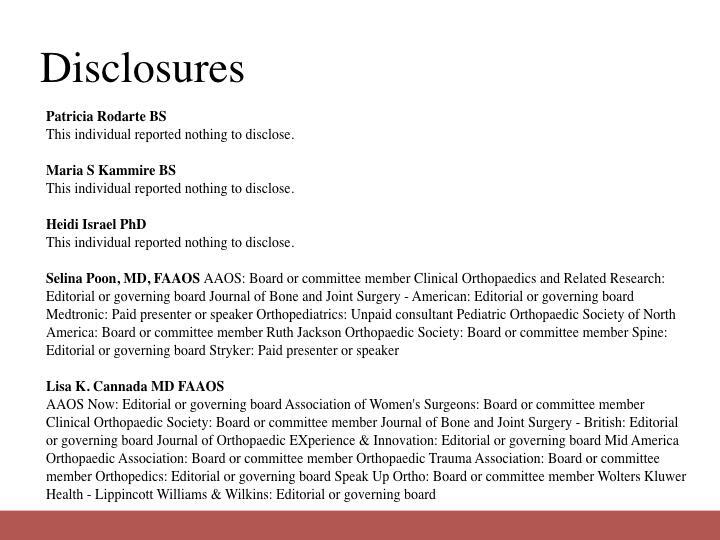This is the second of four award-winning presentations from the inaugural Medical School Orthopedic Society (MSOS) symposium. MSOS is a medical student-run initiative with a mission to support “research and educational opportunities for students interested in orthopedic surgery.”
This presentation was given by Patricia Rodarte, a third-year medical student at the Warren Alpert Medical School of Brown University.

We know that orthopaedic surgery is one of the least diverse fields in medicine, where women make up only 8% of practicing orthopaedic surgeons.Studies show that women physicians in general are often reported more often than their male counterparts for the same violation, and often do more administrative work. However, workplace conflict that female physicians encounter within orthopaedic surgery specifically has not been extensively studied.

Our goal was to examine the conflict that female orthopedic surgeons experience, its context, and the impact of that conflict on their career and well being.

In order to do this, we created a survey with demographic questions and several conflict scenarios, such as the ones listed here. The survey was distributed to the Ruth Jackson Orthopaedic Society, a professional orthopaedic society dedicated to the advances of women in the field. We also distributed the survey to the Women in Orthopaedics Facebook group, which is a Facebook group exclusive to women orthopaedic surgeons in practice or in training.

We had 373 respondents. The majority were between 30-40 years old and Caucasian which is consistent with the current workforce in the field. Of note, 73% reported being described as “bossy, too assertive, pushy, demanding or difficult” in the workplace, and 80% reported doing more administrative work than their male counterparts. 51% also answered that they were likely to be written up for behavior that their male counterparts had not been written up for. Surgeons who had been reported listed depression, anxiety, burnout, and sleep disturbances as emotional effects of the event. 29 respondents answered that they were forced out or left their previous job due to workplace conflict
Importantly, when asked if they would choose the same career again, 21% of women orthopaedic surgeons said no.

Our research aligns with prior studies that show that female physicians encounter unique workplace conflict. Within orthopaedic surgery, navigating this bias on a daily basis leads to less career satisfaction and greater rates of burnout, leading 21% of female orthopaedic surgeons to say they would not choose the same career again.
The low number of surgeons from minority racial groups in our study does not give us the statistical power to examine the intersectionality of race and gender in workplace conflict. However, a study by Ode et al notes that even within Black orthopaedic surgeons, female surgeons reported lower occupational opportunity and greater bias than male surgeons.

In conclusion, our study shows us that female orthopedic surgeons have unique workplace conflict that diminishes career satisfaction and yields to greater rates of burnout. It is important to understand the relationship between gender bias and workplace conflict to create a more positive working environment for female orthopedic surgeons and incoming trainees.










